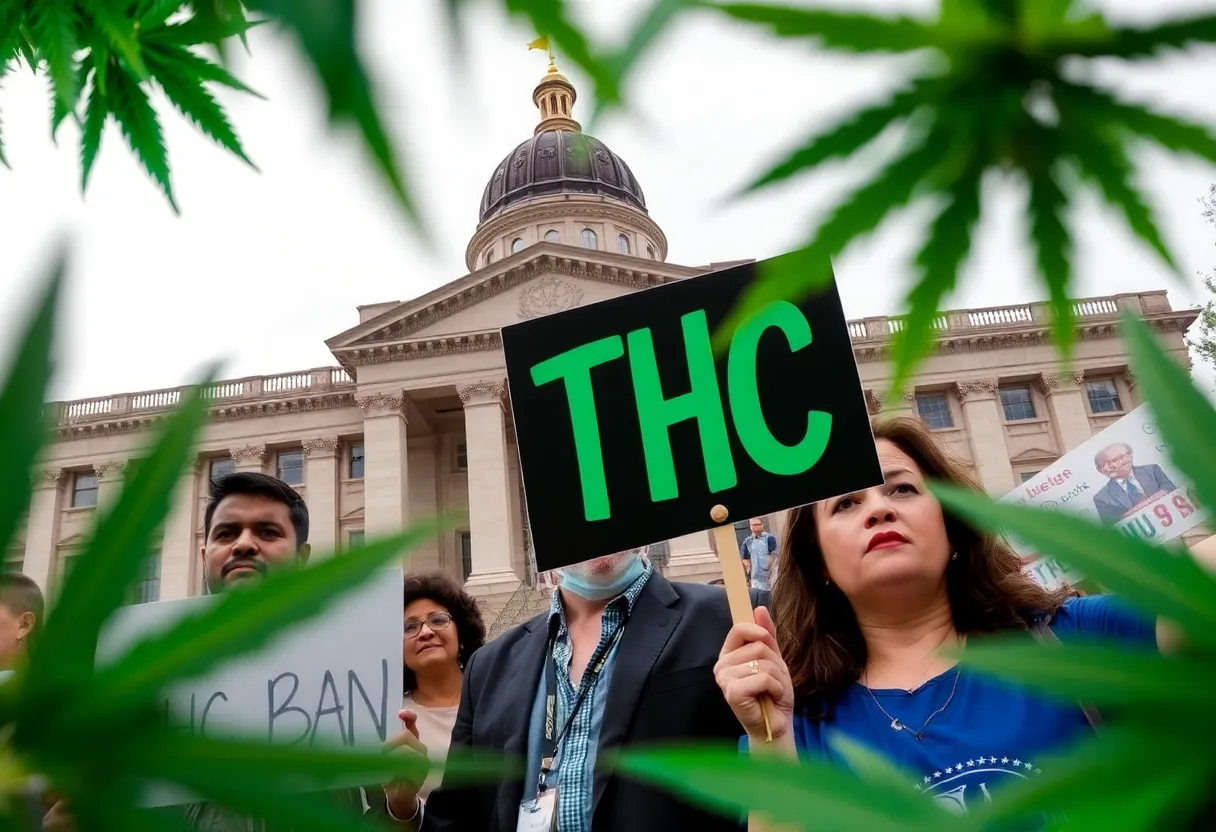

Texas THC Ban Demonstration
The Texas House has passed Senate Bill 3, proposing a ban on all THC products, raising concerns among local businesses and residents. With the THC market valued at $8 billion, the legislation aims to protect consumers from unregulated products. However, critics argue it could lead to significant job losses and economic downturns, with potential penalties for violators. As this bill moves to Governor Abbott’s desk, advocates for the industry emphasize the need for a balanced approach rather than outright bans.
Austin, Texas — The Texas House recently passed Senate Bill 3 (SB3), which prohibits all tetrahydrocannabinol (THC) products across the state. The bill received a 95-44 vote and is now awaiting Governor Abbott’s signature. If enacted, this legislation will impose penalties of up to one year in jail for adults found in possession of THC products.
The THC market in Texas is estimated to be worth $8 billion, raising concerns among local businesses about the potential negative effects of the ban. Supporters, including Lt. Gov. Dan Patrick, argue that the bill is necessary to protect both children and adults from unregulated THC products, which they claim pose safety risks.
SB3, authored by Senator Charles Perry, specifically targets and bans various forms of THC, including Delta 8, Delta 9, and other intoxicating THC products such as beverages. The legislation permits the sale of non-intoxicating cannabinoids like CBD and CBG. Importantly, it does not affect Texas’ Compassionate Use Program for medical cannabis, addressing usage for specific medical conditions.
The Texas Hemp Business Council has voiced strong opposition to the bill, arguing that it dismantles the legal hemp industry within the state. The Council expressed concerns about the needs of small businesses and consumers being overlooked. Over the past decade, the state has seen a significant rise in CBD shops, a trend that emerged after the legalization of hemp through previous federal and state laws.
Past legislation, such as the Hemp Farming Act of 2018 and House Bill 1325 in 2019, had allowed the THC industry to expand due to relatively lax regulatory oversight. Many retailers began offering products containing alternative THC compounds like delta-8 and delta-10, exploiting loopholes in existing regulations. Critics of the new bill suggest that this prohibition may lead to substantial job losses across the sector.
The economic ramifications of SB3 could be dire, with estimates suggesting that the ban may result in a loss of up to $268 million in tax revenue for Texas. An analysis indicates that as many as 53,000 Texans could be impacted in terms of employment, raising concerns about an impending economic downturn in areas heavily reliant on the THC market.
The legislation also establishes criminal offenses related to the manufacture, delivery, or possession of THC products. Retailers will face strict compliance timelines in adapting to the new law if it is signed by the governor. The implementation would take effect in September, allowing businesses until January to adjust to the ban.
Proponents of SB3, including Lt. Gov. Patrick, have asserted that unregulated THC products are often marketed to children, raising significant public safety concerns. An industry advocacy group stresses that many Texans, including veterans, use THC products for various wellness purposes, suggesting that the legislation may negatively affect a substantial segment of the population reliant on these products for health benefits.
Opponents of the bill argue that a prohibitionist approach will likely fuel the growth of a black market for THC products, countering the intended effects of the law. Additionally, there are discussions among lawmakers about expanding the Compassionate Use Program to enhance access to medical marijuana, signaling potential changes ahead in the state’s cannabis policies.
As Texas joins a growing number of states that have restricted or banned intoxicating hemp products, the future of its burgeoning hemp and THC market remains uncertain, hinging on the California governor’s forthcoming decision on the legislation.
News Summary Daniel Ricciardo, former Formula 1 driver, is embracing a new venture in Austin…
News Summary Texas has experienced remarkable job growth, adding 213,300 nonfarm jobs over the past…
News Summary In response to the significant destruction caused by a severe storm, the Austin…
News Summary The Killeen Daily Herald secured ten prestigious awards at the Texas Press Association's…
News Summary Lisa Su, the CEO of AMD, has been named Time Magazine's CEO of…
News Summary California Senator Alex Padilla confronted Vice President JD Vance after a name mix-up…